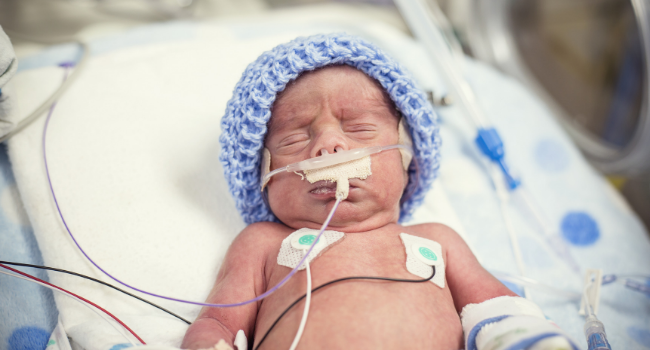
Study of Outcomes in Mothers and Infants (SOMI)
San Diego SOMI is a research discovery platform with the goal of better understanding the complex combination of factors – from biological to social, from economic to environmental – that contribute to child health outcomes. To do this, we combine and use existing sets of data that have been collected from San Diego County communities, families, and individuals over the last 10 years and for the next 10+ years – representing a total of 1 million mother-child pairs!
Seed funding for the SOMI has been provided by the Rady Children’s Institute for Genomic Medicine.
Our Mission
The mission of SOMI is to predict and promote healthy outcomes in mothers, infants and children in collaboration with community and public health partners.
The SOMI data platform will allow multi-disciplinary researchers, policy makers, and other stakeholders to visualize and quantify disparities in child health outcomes across San Diego County and over time.
To achieve this, SOMI will utilize county-wide publicly and non-publicly available data on medical, environmental, socioeconomic, policy, and service uptake for the SOMI Million Person Mother/Child cohort.
SOMI Foci and Data Sources
Genetic Factors
Environmental Exposure
Social Determinants
Explore SOMI by Topics
Hover over and click on the topic to explore SOMI factors




Respiratory distress syndrome (RDS) is a breathing disorder that mostly affects premature newborns, making it hard for the baby to breathe and get enough oxygen. Babies with RDS are at high risk of developing bronchopulmonary dysplasia (BPD), a serious condition of the lung that may need treatment for months or even years into childhood.
Infants and children with BPD are at risk for complications resulting in readmission to the hospital; however, the risk and protective factors associated with the health of infants and children with BDP require further investigation. Using the SOMI platform and clinical data as available from Rady Children’s Hospital, we will determine what factors influence the long-term outcomes for children with BPD, which could subsequently inform interventions to improve outcomes for those children.
A congenital heart defect (CHD) is a problem with the structure of the heart that is present at birth. CHDs are the most common type of birth defect, and affect approximately 1% of babies born each year. Although there are known risk factors for CHDs, such as poorly controlled maternal diabetes, the causes of CHD for most babies are unknown.
Using the SOMI platform, we will map CHDs across San Diego County and overlay sociodemographic, health and environmental factors to generate hypotheses that can then be tested in the context of genomic and other biological predictors to determine how some CHDs occur and potentially may be prevented.
The U.S. infant mortality rate in 2016 was 5.9 deaths per 1000 live births. The leading causes of infant death at that time were birth defects, preterm birth and low birth weight, sudden infant death syndrome (SIDS), maternal pregnancy complications, and injuries. Within SIDS deaths, although the specific cause is usually not known, known risk factors that increase risk are sleep position, prematurity, non-white race, a family history of SIDS, prenatal exposure to binge patterns of alcohol consumption, and postnatal exposure to secondhand tobacco smoke.
Similarly, there are children who die suddenly of unknown causes in childhood or adolescence. In both circumstances, there may be a genetic and/or environmental profile that strongly predicts risk for sudden death. If such a profile can be identified, this could lead to prophylactic interventions, such as medication treatment for children at high risk.
Preterm birth (delivery at <37 weeks of gestation) leads to significant risks for the infant including physical and neurodevelopmental complications. Preterm birth occurs more frequently in the U.S. than in other developed countries; however, it is unknown exactly what drives these unacceptably high rates. There is also a large and persistent disparity between preterm birth rates among non-Hispanic White and Black women. Black women are 50% more likely to deliver preterm compared with women of all other races/ethnicities, and these rates do not change with increases in socioeconomic status, maternal education, or paternal education.
Furthermore, there are health disparities by birthplace of the mother. For example, foreign-born Black or Hispanic women who move to the U.S. and have children are less likely to deliver preterm than similar women who were born in the U.S. It is unknown to what extent this disparity is due to social determinants, diet, genetic factors or combinations of these factors. There is an urgent need to understand what risk factors are contributing to these disparities so that interventions can be designed to reduce preterm birth rates in San Diego County, thereby improving the health of infants and children. We will use the SOMI Platform and associated biological samples for women who have delivered in San Diego County to examine stress-associated factors for preterm birth, and determine whether they differ by race and mother’s country of birth.
SOMI Team
Gathering breadth of passion and expertise to work on the solutions

Christina Chambers
Principle Investigator | UCSD
Dr. Christina Chambers is the SOMI principal investigator, and co-directs the Center for Better Beginnings in the Department of Pediatrics at UC San Diego.
Dr. Chambers is a perinatal epidemiologist specializing in the area of environmental causes of adverse pregnancy outcomes, birth defects, and childhood disabilities, with a special focus on human teratogens (environmental agents that cause birth defects or other adverse prenatal outcomes).

Gretchen Bandoli
Co-PI | UCSD
Dr. Gretchen Bandoli is a perinatal epidemiologist and Assistant Professor in the Department of Pediatrics at UC San Diego. Her research focuses on perinatal and early childhood determinants of neurodevelopment and health.

Laura Jelliffe
Co-I | UCSF
Dr. Laura Jelliffe-Pawlowski is an Associate Professor of Epidemiology & Biostatistics in the School of Medicine at UC San Francisco (UCSF) and is the Director of Precision Health and Discovery with the UCSF California Preterm Birth Initiative.
Dr. Jelliffe-Pawlowski and her team work to identify new tools, tests, and technologies that can help identify pregnant women and babies at increased risk for preterm birth and associated birth defects and developmental delays.

Kelli Ryckman
Co-I | U of Iowa
Dr. Kelli Ryckman is an Associate Professor at the University of Iowa in the Department of Epidemiology. Dr. Ryckman researches genetic and metabolic mechanisms associated with adverse pregnancy outcomes. Much of her work includes analyzing data from prenatal and newborn screening programs to identify risk markers for adverse birth and childhood outcomes.

Marta Jankowska
Research Scientist | City of Hope
Dr. Jankowska is an Assistant Research Scientist in the Calit2/Qualcomm Institute at the University of California, San Diego. Her expertise is in spatial analytics including GIS, GPS, and spatial statistics as applied to health related problems.

Naomi Abe
Research Scientist | UCSD
Dr. Naomi Abe is an Assistant Clinical Professor and a Pediatric Emergency Medicine Physician in the Department of Pediatrics at UC San Diego. She is also board certified in Internal Medicine. Her research is currently focused on parental mental health and infant health outcomes. Broadly, her work aims to uncover the intersections of parental and child health, and to identify interventions that may improve both.

Jiue-An (Jay) Yang
Developer Lead | City of Hope
Dr. Jiue-An Yang is a research scientist in the Calit2/Qualcomm Institute at the University of California, San Diego. Jay focuses on the analysis of geographic information in personal and public health informatics, the implementation of machine learning algorithms in behavioral health studies, and the development of information visualization applications for data-driven health science.

Rebecca Baer
Research Analyst | UCSF
Ms. Rebecca Baer is a Senior Statistician for the SOMI study at UC San Diego and the UC San Francisco California Preterm Birth Initiative. Ms. Baer was previously a research scientist with the California Department of Public Health.

Jessica Block
Research Analyst | UCSD
Jessica Block is a research analyst with Calit2/Qualcomm Institute at UC San Diego. She is an urban geologist specializing in the use of sensor networks, remote sensing, and geospatial visualization tools for policy decision-making, and sustainability issues.

Erin Delker
SOMI Scholar
Erin is an epidemiologist and post-doctoral researcher in the Department of Pediatrics at UC San Diego. She is most interested in contributing to research at the intersection of cardiovascular disease and pregnancy, with additional interests in epidemiologic methods, mental health, and social determinants of health.

Join Us !
Become a SOMI Scholar
San Diego Study of Outcomes in Mothers and Infants (SOMI) Scholar Description
The SOMI study is a rich birth cohort dataset encompassing ~6 million infants born in California between 2007-2017, with research emphasis on births in San Diego County. Through the linkage of birth records, hospital discharge summaries, census data, environmental factors, maternal and infant serum/bloodspots, and other data sources, the birth cohort allows researchers the opportunity to study the complex combination of factors – from biological to social, from economic to environmental – that contribute to maternal and child health outcomes.
Individuals who are selected for appointment as SOMI Scholars are researchers (graduate students, faculty) who have demonstrated interest, skills, and ability to commit sufficient time to engage in research in maternal/child health. SOMI Scholars will bring a wide range of expertise to the project that are consistent with the diverse objectives of the SOMI study, and will contribute to as well as benefit from involvement with the SOMI research team. Successful applicants for SOMI Scholar appointments will be asked to commit to the following activities by formal agreement:
A minimum time period of 18 months of participation on the SOMI project
At least one manuscript prepared per year with the goal of submission to a peer reviewed journal
Participation in at least one 60-minute SOMI research team meeting or teleconference per month
Assistance, as available and applicable, in reviewing SOMI related documents, creating or revising website content, contributing to manuscripts or grant proposals
Maintaining adherence to all requirements regarding data access, confidentiality, security, ethics training and ethics approval for specified projects and associated data use
Additionally, along with the expectation that analyses will be carried through towards published manuscripts, the SOMI research team retains the rights to finish and publish any project that is not published within six months of the end date of the SOMI Scholar appointment.
Latest Publications from SOMI
- Bandoli G, Baer RJ, Owen M, Kiernan E, Jelliffe-Pawlowski L, Kingsmore S, Chambers CD. Maternal, infant, and environmental risk factors for sudden unexpected infant deaths: results from a large, administrative cohort. J Matern Fetal Neonatal Med. 2021 Dec 1:1-8. doi: 10.1080/14767058.2021.2008899. Epub ahead of print. PMID: 34852708 [LINK.]
- Bandoli G, Suttner D, Kiernan E, Baer RJ, Jelliffe-Pawlowski L, Chambers CD. Risk factors for neonatal encephalopathy in late preterm and term singleton births in a large California birth cohort. J Perinatol. 2021 Oct 26. doi: 10.1038/s41372-021-01242-z. Epub ahead of print. PMID: 34702969. [LINK.]
- Bandoli G, Jelliffe-Pawlowski L, Schumacher B, Baer RJ, Felder JN, Fuchs JD, Oltman SP, Steurer MA, Marienfeld C. Cannabis-related diagnosis in pregnancy and adverse maternal and infant outcomes. Drug Alcohol Depend. 2021 Aug 1;225:108757. doi: 10.1016/j.drugalcdep.2021.108757. Epub 2021 May 21. PMID: 34049105; PMCID: PMC8282693. [LINK.]
